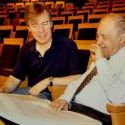-
03
-
03
-
03
-
03
-
03
-
03
-
03
-
03
-
03
-
03
-
03
-
-
-
03
-
03
-
03
-
03
-
03
-
03
-
03
-
03
-
-
03
-
03
-
03
-
03
-
03
-
-
03
-
03
-
03
-
03
-
-
03
Deep Focus: Enriching the Aspen Experience
An array of micro-essays by accomplished musicologists, curated to enhance and enrich your historical and aesthetic engagement with the musical programming offered at Aspen’s summer seasons.
Ravel and the Russians: Echoes in Modern Media and Film Scores

Join Ravel expert Jessie Fillerup on a tour of the influence Ravel’s Second Suite from Daphnis and Chloé has had on film music—and its connections to the rest of this summer’s program.
(continue reading)“Some miserere modern enough”: Auden, Bernstein, and The Age of Anxiety

In this essay, Imani Mosley traces the divergent postwar temporalities of W. H. Auden’s poem The Age of Anxiety and the Leonard Bernstein Symphony that it inspired.
(continue reading)Between the Sacred and the Symphonic: Mendelssohn’s Reformation Symphony

Peter Mercer-Taylor, an expert on Mendelssohn and religious music, discusses the Reformation Symphony’s origins in the commemoration of the Lutheran Reformation and explores its greater innovation, the reclamation of J. S. Bach for the symphonic tradition.
(continue reading)Coming Into Being

In honor of Pierre Boulez’s 100th anniversary in 2025, Maestro David Robertson reflects on his working relationship with the composer, focusing particularly on the repertoire he will perform with the Aspen Contemporary Ensemble on July 9.
(continue reading)Aspen & American Music

In the final entry of the 2024 Deep Focus series, Assistant Program Book Editor Christine Marie Goss takes a whirlwind tour through the history of the Aspen Music Festival, with special attention to its place in American composition, its sterling contribution to performance at the highest level, and its potential to bring inclusive change to the world of classical music.
(continue reading)-
03
-
03
-
03
-
03
-
03
-
03
-
03
-
03
-
03
-
03
-
03
-
-
-
03
-
03
-
03
-
03
-
03
-
03
-
03
-
03
-
-
03
-
03
-
03
-
03
-
03
-
-
03
-
03
-
03
-
03
-
-
03